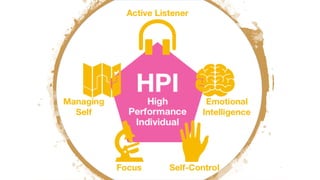High Performance Individuals (HPIs) - Assessing Talent
•
0 likes•168 views
High Performance Individuals (HPIs) demonstrate 5 key capabilities: Active Listener, Emotional Intelligence, Self-Control, Focus, and Managing Self. These presentation materials provide approaches to help assess a candidates degree of capability across these 5 competencies.
Report
Share
Report
Share
Download to read offline

Recommended
Recommended
Presentation by Jennifer Gould & Joshua Hettrick, Westfield State University
Presented at a NEACUHO Conference
www.neacuho.orgManaging Up: Engaging your supervisor in productive ways

Managing Up: Engaging your supervisor in productive waysNortheast Association of College and University Housing Officers
More Related Content
What's hot
Presentation by Jennifer Gould & Joshua Hettrick, Westfield State University
Presented at a NEACUHO Conference
www.neacuho.orgManaging Up: Engaging your supervisor in productive ways

Managing Up: Engaging your supervisor in productive waysNortheast Association of College and University Housing Officers
What's hot (11)
Dr Laoise O' Murchu, PhD, presentation at IABC World Conference, New York, 2013

Dr Laoise O' Murchu, PhD, presentation at IABC World Conference, New York, 2013
Shaun Vembutty | The Educator Management Style: Tips and Pointers

Shaun Vembutty | The Educator Management Style: Tips and Pointers
Managing Up: Engaging your supervisor in productive ways

Managing Up: Engaging your supervisor in productive ways
Similar to High Performance Individuals (HPIs) - Assessing Talent
Similar to High Performance Individuals (HPIs) - Assessing Talent (20)
Interpersonal and Communication Skills Development

Interpersonal and Communication Skills Development
interpersonaskills-150721102929-lva1-app6892-2.pdf

interpersonaskills-150721102929-lva1-app6892-2.pdf
Essentials of the Solution Focused Approach to Helping

Essentials of the Solution Focused Approach to Helping
Soft Skills as Transferable Skills - What, Why & How? 

Soft Skills as Transferable Skills - What, Why & How?
High Performance Individuals (HPIs) - Assessing Talent
- 2. Active Listener Monitor Active Listening traits Appropriate (small) smiles combined with nods to affirm messages; with eye contact Leaning slight forward with posture and mirroring the speaker’s expressions Remembering key points; using these for questioning, reflection and summarizing Often times we are engaging with candidates using phone or video conference (VC) technologies. Whenever possible use VC. You are adding an extra dimension of engagement for both you and the candidate – just make sure the tech works well! Not to worry if you do not have VC, you can still easily determine if the candidate is actively listening – or easily distracted!
- 3. Emotional Intelligence Understand how well they know themselves – strengths, weaknesses, areas they are developing Review their skills in influencing & persuading others Find out when they like to work alone or with a team; and the roles they play in the scenarios Additional detail from HBR:
- 4. Self- Control How do they maintain balance across the various dimensions of their life – personal, professional, hobbies Find about about times when they have had to control frustrations / stay calm when things didn’t go their way Understand their approach to handling situations when they know they are right, but they are facing an opposing view and time is of the essence – their willpower What accomplishment are they most proud and how do they share this with others – their level of self- confidence?
- 5. Focus Find out their view on multitasking Individuals with great focus both measure results as well as concentrate on the process (not the event) Focus happens when you say yes to one option and no to all other options – determine their decision making process Focus requires organized prioritization – understand their techniques for prioritizing At a time with “agile” is the word de jour, can we also have ”focus”? The short answer is YES. Agile seeks to deliver value early and often; as well as, making adjustments when new information is made available. Agile and focus compliment each other.
- 6. Managing Self How well they manage their time – and yours – is a great insight Saying “no” is never easy but often necessary; self-managers know how to protect their time Understanding how they have escalated issues in the past helps to illustrate if they are a problem solver and proactive in presenting solutions Because of their strong understanding of themselves, they know when (and where) they will be most productive
